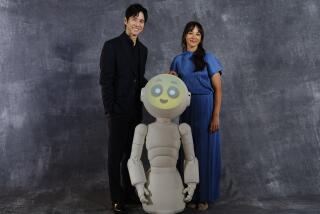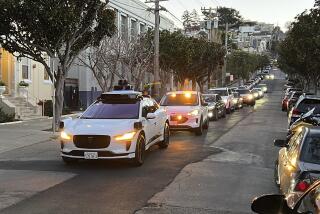Robotic babies intended to reduce teen pregnancies may have had the opposite effect
- Share via
Sex education can be a fraught chapter in a young person’s life.
It usually involves clinical diagrams, uncomfortable discussions and possibly the unforgettable experience of watching your gym teacher stretch a condom over a banana.
In some parts of the world, schools have kicked it up a notch by giving teenagers robotic babies to take care of for an entire weekend. It’s the high-tech version of babysitting an egg for the weekend. Either way, the exercise is meant to emphasize how all-consuming it is to care for an infant — and hopefully motivate students to do everything in their power to make sure they don’t become teen parents.
Ironically, the lifelike baby dolls may do just the opposite by glamorizing the life of a teen mom.
Researchers tracked 2,834 young women who went to non-Catholic schools in Perth, Australia. Among them, 1,267 participated in the “Virtual Infant Parenting” program when they were between the ages of 13 and 15, caring for their crying, eating, pooping infant facsimiles.
The other 1,567 girls didn’t get dolls to take care of, and they served as controls.
The researchers kept track of the young women until they turned 20 (and thus were too old to qualify as teen mothers). In particular, the researchers checked the students’ medical records to see if they had given birth or had an abortion.
Overall, they found that 13% of the study participants became pregnant during the course of the study. One-quarter of these young women got pregnant more than once.
Being saddled with a robot baby didn’t have its intended effect — 210 of the young women who participated in the VIP program went on to become pregnant. That compares with 168 pregnancies among the larger group of young women who didn’t get the high-tech dolls.
Alumnae of the VIP program were also more likely to give birth — 8% of them did so, compared with 4% of young women from the control group.
Even when the researchers made allowances for factors like socioeconomic status and history with vices like alcohol and cigarettes, the students who went through the teen pregnancy prevention program were 51% more likely to become pregnant teens than their peers who didn’t go through the program.
There was only one conclusion for the researchers to make: “The infant simulator-based VIP programme did not achieve its aim of reducing teenage pregnancy,” they wrote in the journal Lancet.
In commentary that accompanied the study, Julie Quinlivan of the Institute for Health Research at the University of Notre Dame Australia suggested there may be a good reason for this.
The virtual infant parenting program “exaggerates the positives and diminishes the negatives” of caring for an infant, Quinlivan wrote. In doing so, it makes teen parenthood seem more appealing, not less.
“Teenagers playing with their dolls receive positive feedback from their peers and family at an age when they crave such attention,” she explained. But in real life, “being a parent is more than just feeding, burping, and nappy changes.”
Among the program’s other drawbacks is the fact that it only targets girls, and it takes place when those girls are already in adolescence. she said. By that point, the socioeconomic, environmental and educational factors that contribute to the likelihood of teen pregnancy have been set.
“The cure for teenage pregnancy is more difficult than a magic doll,” wrote Quinlivan, who decried the Virtual Infant Parenting program as a “quick fix.”
In the United States, teen pregnancy has declined continuously over the past two decades, hitting an all-time low in 2014 (the most recent year that data is available) according to the U.S. Department of Health and Human Services. A study from the Centers for Disease Control and Prevention released in 2014 credited improved access to and education about contraception and abstinence for the decline.
MTV may also deserve some credit: A 2014 study found that the unscripted show “16 and Pregnant,” which details the decidedly unglamorous reality of teen pregnancy and motherhood, may have contributed to as much as a 6% decline in the teen pregnancy rate.
Maybe Australia should lose the robot babies and screen the MTV series instead.
Follow me on Twitter @jessica_roy and “like” Los Angeles Times Science & Health on Facebook.
MORE IN SCIENCE
Hot? You can cool down by suiting up in this high-tech fabric
Amazing ring of fire eclipse this morning: Here’s a 40-second recap
Ancient cone-like fossils suggest life on Earth may go back more than 3.7 billion years







